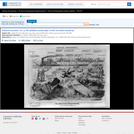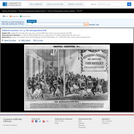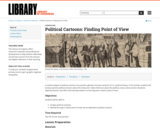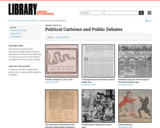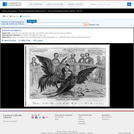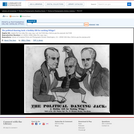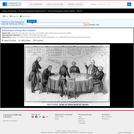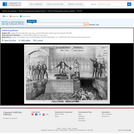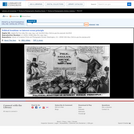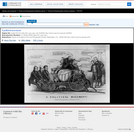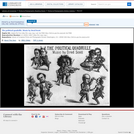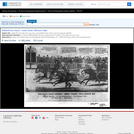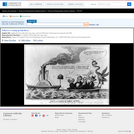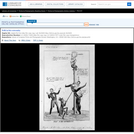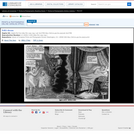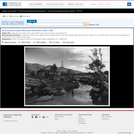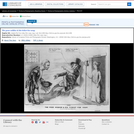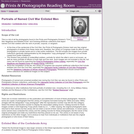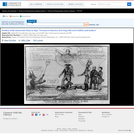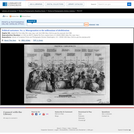
The second in a series of anti-Lincoln satires by Bromley & Co. This number was deposited for copyright on July 1, 1864. The artist conjures up a ludicrous vision of the supposed consequences of racial equality in America in this attack on the Republican espousal of equal rights. The scene takes place in a park-like setting with a fountain in the shape of a boy on a dolphin and a large bridge in the background. A black woman (left), "Miss Dinah, Arabella, Aramintha Squash," is presented by abolitionist senator Charles Sumner to President Lincoln. Lincoln bows and says, "I shall be proud to number among my intimate friends any member of the Squash family, especially the little Squashes." The woman responds, "Ise 'quainted wid Missus Linkum I is, washed for her 'fore de hebenly Miscegenation times was cum. Dont do nuffin now but gallevant 'round wid de white gemmen! . . . " A second mixed couple sit at a small table (center) eating ice cream. The black woman says, "Ah! Horace its-its-its bully 'specially de cream." Her companion, Republican editor Horace Greeley, answers, "Ah! my dear Miss Snowball we have at last reached our political and social Paradise. Isn't it extatic?" To the right a white woman embraces a black dandy, saying, "Oh! You dear creature. I am so agitated! Go and ask Pa." He replies, "Lubly Julia Anna, name de day, when Brodder Beecher [abolitionist clergyman Henry Ward Beecher] shall make us one!" At the far right a second white woman sits on the lap of a plump black man reminding him, "Adolphus, now you'll be sure to come to my lecture tomorrow night, wont you?" He assures her, "Ill be there Honey, on de front seat, sure!" A German onlooker (far right) remarks, "Mine Got. vat a guntry, vat a beebles!" A well-dressed man with a monocle exclaims, "Most hextwadinary! Aw neva witnessed the like in all me life, if I did dem me!" An Irishwoman pulls a carriage holding a black baby and complains, "And is it to drag naggur babies that I left old Ireland? Bad luck to me." In the center a Negro family rides in a carriage driven by a white man with two white footmen. The father lifts his hat and says, "Phillis de-ah dars Sumner. We must not cut him if he is walking." Their driver comments, "Gla-a-ang there 240s! White driver, white footmen, niggers inside, my heys! I wanted a sitiwation when I took this one." The term "miscegenation" was coined during the 1864 presidential campaign to discredit the Republicans, who were charged with fostering the intermingling of the races. In the lower margin are prices and instructions for ordering various numbers of copies of the print. A single copy cost twenty-five cents "post paid."|Entered . . . 1864 by Bromly & Co. . . . New York.|Title appears as it is written on the item.|Weitenkampf, p. 141-142.|Forms part of: American cartoon print filing series (Library of Congress)|Published in: American political prints, 1766-1876 / Bernard F. Reilly. Boston : G.K. Hall, 1991, entry 1864-38.
- Subject:
- History
- U.S. History
- Material Type:
- Diagram/Illustration
- Primary Source
- Provider:
- Library of Congress
- Provider Set:
- Library of Congress - Cartoons 1766-1876
- Date Added:
- 06/08/2013
